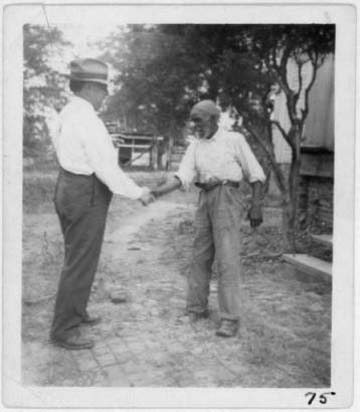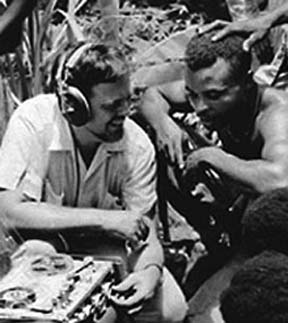|
Issue #17 Sept. 15th - Sept. 28th, 2006
The Lomax Legacy
In 1910, John Lomax became president of the Texas Folklore Society, which hoped to encourage general interest in folk and story music. It was during this time that John set out across America, armed with an antique 350 pound recording machine, and secured his first collection of folk music from the states. During this time, songs like “Come Along Little Doggie” and “Home on the Range” were first discovered, contributing to Alan’s first book Cowboy Songs and Frontier Ballads. After that, the phonograph recordings began to flood into the Library of Congress with no signs of stopping. The Lomax recordings proved that the poor have a voice and culture worth hearing. More than that, the amassed songs brought these cultures to the public eye and invigorated a worldwide cultural tether that helped create a kind of familiarity amongst otherwise opposite communities. During the Lomax’s time together, many other great folk singers were discovered, including the powerful songster Mance Lipscomb. The well known blues player, Muddy Waters, was first recorded by Alan Lomax in a cabin on the Stovall Plantation in 1941. Countless other musicians were able to save their songs for future generations--many of which would have otherwise been lost or forgotten if John and Alan Lomax hadn’t expressed a drive to preserve them.
“For the first time, predictable and universal relationships have been established between the expressive and communication processes, on the one hand, and social structure and culture pattern, on the other.” In a documentary on a PBS special, “American Roots Music”, Alan Lomax recalls his encounters with Oklahoma’s Woody Guthrie and their experiences together. Lomax recalls asking: “Woody, what are you going to do with your life?” And Woody replied, “I’m going to go back down there to Oklahoma and get me a pair of six guns, and I’m going to break those banks and get that money back to those poor people.” Guthrie won the national prize for best music show after the CBS radio broadcasts on Alan’s program, later becoming a hall of fame folk legend. After his father’s death, Alan expressed an unrelenting passion for musicology. Collection after collection were recorded and tucked away while Alan contributed to radio, television and documentaries, not to mention several albums where his own musical talents were showcased. By 1993, Lomax had won the National Book Critics Circle Award for The Land Where the Blues Began. Shortly after, Lomax suffered a severe brain hemorrhage that disabled his ability to communicate properly. A short time later, in 2002, Alan Lomax died, but won the Grammy Trustees Award in 2003 for his accomplishments and contributions over the years. Today the legacy the Lomaxs left behind is remarkable. Over 5,000 hours of music are still on record at the Library of Congress, along with 400,000 feet of film that spans over two generations. Together the Lomax family organized the most extensive and in depth collection of folk music ever recorded. John and Alan Lomax gave their lives to bringing people together through music. Listen to some of these amazing songs and find out why. For more information on Alan Lomax, his life, recordings and books, visit www.alan-lomax.com |
||
©2006 NONCO Media, L.L.C.

 From 1867 to 2002, John and Alan Lomax (father and son), may have contributed more to music than any other men in history. They traveled the world--from the most established metropolitan cities to the smallest farm communities--and ended up recording over ten thousand folk songs from a wide array of cultures, all of which remain in the Library of Congress to this day. The albums accumulated over the years range from Italian sea shanties to the chain gang hymns from early American penitentiaries. The Lomaxs explored and documented Caribbean, Spanish and even Irish folk music--not to mention songs sung by the impoverished workers from England, Scotland and Wales.
From 1867 to 2002, John and Alan Lomax (father and son), may have contributed more to music than any other men in history. They traveled the world--from the most established metropolitan cities to the smallest farm communities--and ended up recording over ten thousand folk songs from a wide array of cultures, all of which remain in the Library of Congress to this day. The albums accumulated over the years range from Italian sea shanties to the chain gang hymns from early American penitentiaries. The Lomaxs explored and documented Caribbean, Spanish and even Irish folk music--not to mention songs sung by the impoverished workers from England, Scotland and Wales. The hunt these men immersed themselves in was a kind of musical archaeology. Behind the music, so to say, the Lomax men wanted to find the real roots beneath cultural songs and folk melodies. By the time of John’s death in 1948, his son Alan had already embraced what seemed to be an inherent devotion to collecting folk music from around the world. From that point on, Alan Lomax took after his father and soon became a pioneer in Cantometrics, the study of traditional folk songs and broadened cultural understanding of music throughout the globe. Alan wrote:
The hunt these men immersed themselves in was a kind of musical archaeology. Behind the music, so to say, the Lomax men wanted to find the real roots beneath cultural songs and folk melodies. By the time of John’s death in 1948, his son Alan had already embraced what seemed to be an inherent devotion to collecting folk music from around the world. From that point on, Alan Lomax took after his father and soon became a pioneer in Cantometrics, the study of traditional folk songs and broadened cultural understanding of music throughout the globe. Alan wrote: